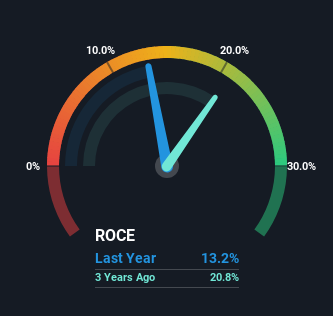- United Kingdom
- /
- Hospitality
- /
- LSE:TEG
Some Investors May Be Worried About Ten Entertainment Group's (LON:TEG) Returns On Capital

What are the early trends we should look for to identify a stock that could multiply in value over the long term? Ideally, a business will show two trends; firstly a growing return on capital employed (ROCE) and secondly, an increasing amount of capital employed. Ultimately, this demonstrates that it's a business that is reinvesting profits at increasing rates of return. However, after investigating Ten Entertainment Group (LON:TEG), we don't think it's current trends fit the mold of a multi-bagger.
Understanding Return On Capital Employed (ROCE)
For those that aren't sure what ROCE is, it measures the amount of pre-tax profits a company can generate from the capital employed in its business. To calculate this metric for Ten Entertainment Group, this is the formula:
Return on Capital Employed = Earnings Before Interest and Tax (EBIT) ÷ (Total Assets - Current Liabilities)
0.13 = UK£33m ÷ (UK£276m - UK£26m) (Based on the trailing twelve months to January 2023).
Therefore, Ten Entertainment Group has an ROCE of 13%. In absolute terms, that's a satisfactory return, but compared to the Hospitality industry average of 6.1% it's much better.
View our latest analysis for Ten Entertainment Group

In the above chart we have measured Ten Entertainment Group's prior ROCE against its prior performance, but the future is arguably more important. If you're interested, you can view the analysts predictions in our free report on analyst forecasts for the company.
What Does the ROCE Trend For Ten Entertainment Group Tell Us?
In terms of Ten Entertainment Group's historical ROCE movements, the trend isn't fantastic. To be more specific, ROCE has fallen from 25% over the last five years. Although, given both revenue and the amount of assets employed in the business have increased, it could suggest the company is investing in growth, and the extra capital has led to a short-term reduction in ROCE. If these investments prove successful, this can bode very well for long term stock performance.
On a side note, Ten Entertainment Group has done well to pay down its current liabilities to 9.3% of total assets. That could partly explain why the ROCE has dropped. What's more, this can reduce some aspects of risk to the business because now the company's suppliers or short-term creditors are funding less of its operations. Since the business is basically funding more of its operations with it's own money, you could argue this has made the business less efficient at generating ROCE.
Our Take On Ten Entertainment Group's ROCE
In summary, despite lower returns in the short term, we're encouraged to see that Ten Entertainment Group is reinvesting for growth and has higher sales as a result. These trends are starting to be recognized by investors since the stock has delivered a 8.8% gain to shareholders who've held over the last five years. Therefore we'd recommend looking further into this stock to confirm if it has the makings of a good investment.
If you want to know some of the risks facing Ten Entertainment Group we've found 3 warning signs (1 is a bit concerning!) that you should be aware of before investing here.
If you want to search for solid companies with great earnings, check out this free list of companies with good balance sheets and impressive returns on equity.
Valuation is complex, but we're here to simplify it.
Discover if Ten Entertainment Group might be undervalued or overvalued with our detailed analysis, featuring fair value estimates, potential risks, dividends, insider trades, and its financial condition.
Access Free AnalysisHave feedback on this article? Concerned about the content? Get in touch with us directly. Alternatively, email editorial-team (at) simplywallst.com.
This article by Simply Wall St is general in nature. We provide commentary based on historical data and analyst forecasts only using an unbiased methodology and our articles are not intended to be financial advice. It does not constitute a recommendation to buy or sell any stock, and does not take account of your objectives, or your financial situation. We aim to bring you long-term focused analysis driven by fundamental data. Note that our analysis may not factor in the latest price-sensitive company announcements or qualitative material. Simply Wall St has no position in any stocks mentioned.
About LSE:TEG
Ten Entertainment Group
Ten Entertainment Group plc, together with its subsidiaries, engages in operation of tenpin bowling centers in the United Kingdom.
Good value with adequate balance sheet.
Similar Companies
Market Insights
Community Narratives



